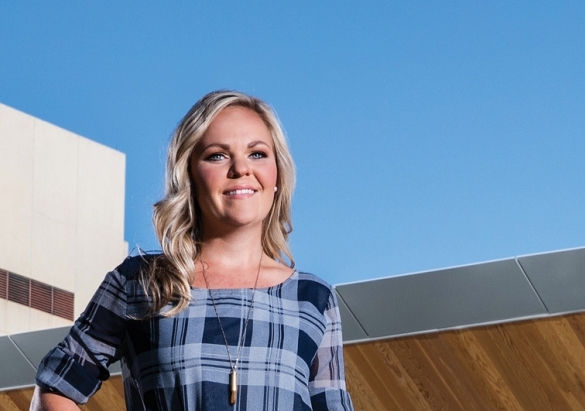Age: 29
Job Title: Occupational Therapist, CASA Child, Adolescent and Family Mental Health
Why She’s Top 40: She is using her training as an occupational therapist to help children who have been abused.
If you could change one thing about Edmonton what would it be? Safer roadways for cyclists. “It would be nice to ride my bike and leave the car at home but, sometimes, bike routes just don’t feel safe or, in the winter, they are not maintained well enough to use.”
When Gayla Grinde took a job as an aide to someone with cerebral palsy, she was looking for income, not resume fodder. But working with her client’s occupational therapist (OT) opened her up to a profession she’d never considered.
Within the health care system, OTs use a host of tools and strategies to help people with health issues like disabilities, brain injuries and mental illnesses. Intrigued by the idea of helping people in creative but concrete ways, Grinde enrolled in a University of Toronto graduate program.
Four years ago, she returned to Edmonton to join CASA Child, Adolescent and Family Mental Health. Much of her work is with children who have survived physical, sexual or psychological trauma. Many suffer from post-traumatic stress disorder and high levels of anxiety. Some can lag behind in motor skills, cognitive development and language. Socially, kids can have trouble with lying, aggression, and physical and emotional boundaries.
“When they grow up, these behaviours are highly stigmatized,” says Grinde. “No one likes a liar.” People with boundary problems can end up in challenging circumstances, she adds, including some that might involve the justice system. Other risks include psychiatric problems and chronic diseases.
Treatment can make all the difference, but talk therapy often doesn’t work for young children, especially those who were abused before they could speak. Using her skills as an OT, Grinde looks to a child’s environment and relationships to help him or her feel safe. Strategies include specific movements and exercises, and sensory experiences like hugs from a loved one. Grinde also plays “sensory detective” to uncover triggers of traumatic memories, like sounds and smells.
